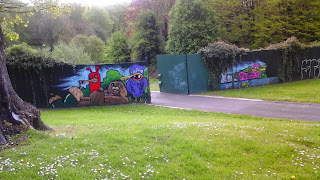Day 5 Fencing in or fencing out?
As is often the
case, the days get longer and more intense as the week goes on here at
Corrymeela. Once again I find myself writing backwards, filling in the
experiences of the days.
Thursday when we
returned to Corrymeela from Belfast we saw that one of the baby sheep had found
a way through the fence and was by the side of the road, desperately trying to
find a way back through to unite with its "tribe". Presumably it's mother was the sheep right on
the other side, clearly distressed and trying to encourage the little one to
find a way back through. There was even a crowd of other sheep nearby,
concerned for what was happening. Happily, with a bit of human encouragement
and shepherding, it found its way through.
I heard the
wonderful theologian, storyteller and author Tex Sample at a conference once
ask the question "are you fencing
in or fencing out?" It's very hard for North Americans to fully grasp the
concept of a "peace wall", which have actually increased in number
since the Good Friday Peace Agreement. Dr. Jonny Byrne, a specialist in this
topic from the University of Ulster, estimated there are about 75 peace walls
in Northern Ireland. He led us on a
walking tour of some of them Thursday morning.
The peace walls
were first constructed by Stormont and the British army in 1969 as a military
response to sectarian violence and disorder. Although many outsiders, especially
North Americans, see them as symbols of a deeply divided society, Jonny helped
us understand that they were also symbols of a community that only feels secure
and safe with the walls in place. Although the government has committed to a
program that builds improved community relations and a more cohesive society,
and the NI Executive has a target date of for the removal of all peace walls
by 2023, Byrne said that the walls will not come down until the communities
behind the walls feel safe and secure. It is a hugely complicated issue, which
if nothing else, our group began to understand the complexities of the issue instead of rushing to judgements based on our own assumptions and experiences
in Canada. For more information, check out http://www.huffingtonpost.co.uk/2014/11/03/peace-walls-northern-ireland_n_6093634.html or google Dr. Jonny Byrne to read about his work. Dr. Byrne took us
to Alexander Park in North Belfast, where Belfast’s only divided park now has
an open access point (pictured below), a huge accomplishment, he said.
That was only the
beginning of the day. From there, we were all welcomed to the home of Padraig O Tuama, Leader of the Corrymeela community for a conversation about "faith in the public square" (more on that conversation in another blog), and then to Holy Cross Parish, in one of
Belfast’s most contentious areas, where for 600 days there has been a protest
in place about a decision to restrict a parade route for an Orange parade. The
Ardoyne area experienced 99 deaths out of the nearly 4,000 attributed to “the
Troubles”, and the work of this parish in the community over decades is well
known and well respected, both locally and internationally.
From Holy Cross,
we went to City Hall for a presentation from David Robinson, Good Relations
Officer (see 2013 blog for a description of David’s work) and a tour of city
hall. When speaking about the peace walls, David also suggested that sometimes
it is necessary to “divide people in order that they can feel safe” and stated
that sadly, 1.5 billion pounds a year are spent servicing a divided society,
including the areas of education, health care, and policing.
We were all left
pondering our own assumptions, the staggering amount of information we had
received over the course of the day, the moving testimonials from the Holy
Cross folks, and connections to our own society. Maybe we don’t
have structural walls, but can we name the invisible walls in our own communities, the
ones that help some feel safe and secure? Do they keep us safe inside, or
others out? Perhaps a bit of both I’d say.





Thanks Martha, I'll take the peace walls image into a few different conversations and contexts in the next month.
ReplyDeletezuuoraao044
ReplyDeletegolden goose outlet
golden goose outlet
golden goose outlet
golden goose outlet
golden goose outlet
golden goose outlet
golden goose outlet
supreme outlet
golden goose outlet
golden goose outlet